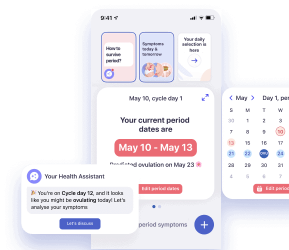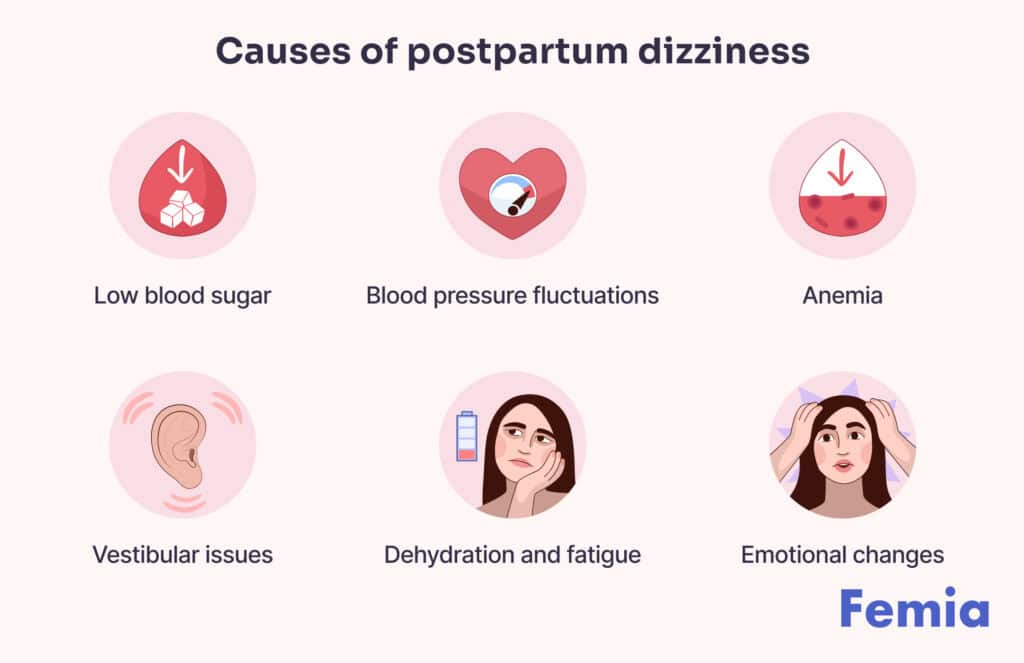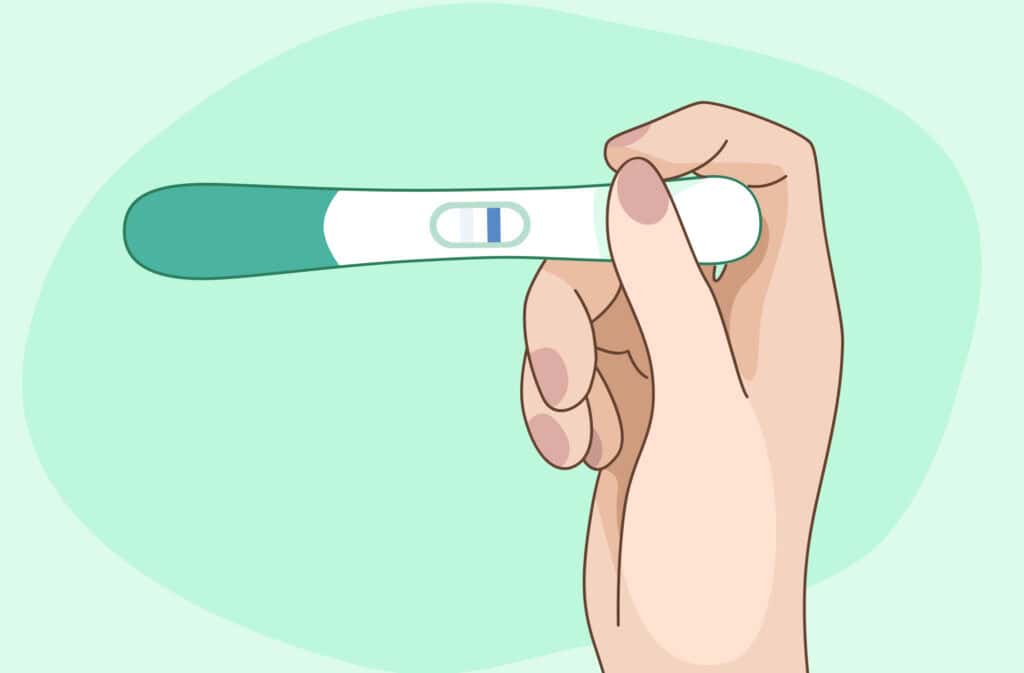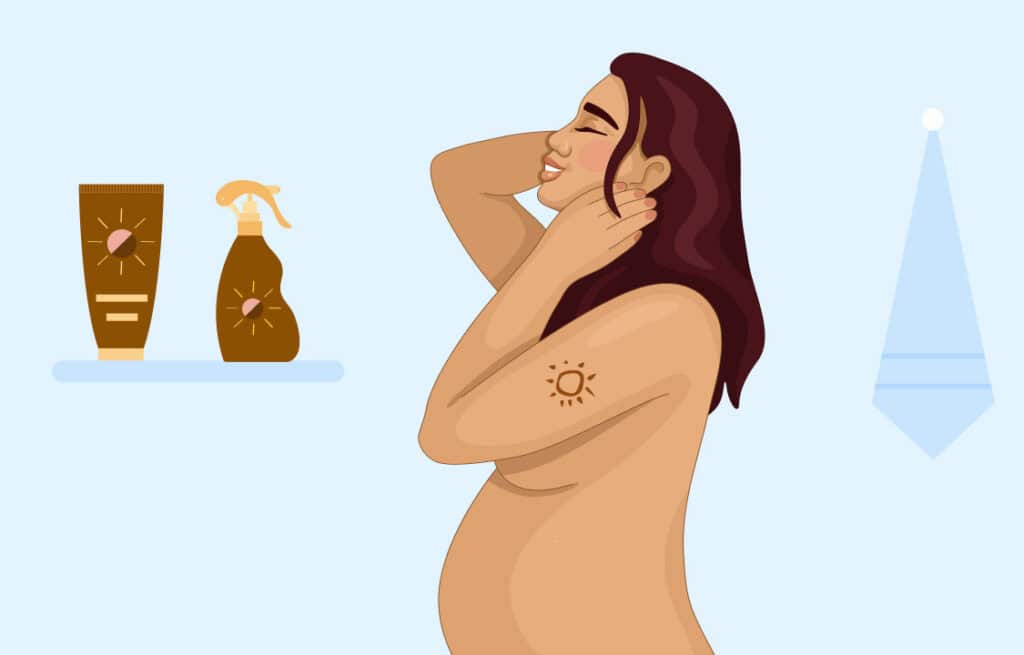Femia > Health Library > Being a mom > Recovering from birth > Understanding postpartum dizziness: Causes, duration and when to seek help
Understanding postpartum dizziness: Causes, duration and when to seek help

- Updated Feb 27, 2025
- Published
CRAFTED BY HUMAN
Crafted by human At Femia, we provide accurate and up-to-date information at every stage of your journey, from trying to conceive, pregnancy and postnatal support. All content is created by a real person based on in-depth research and own professional experience. Femia ensures that you will receive expert advice, strict accuracy and a personalized approach from our authors/medical experts. Learn more about our editorial policy.
FACT CHECKED
Fact checked At Femia Health, we maintain the highest standards of editorial excellence in delivering content focused on helping you conceive, guiding you through pregnancy, and supporting you postpartum. Explore our content review principles to learn how we ensure the accuracy and quality of our health and lifestyle tips for every stage of your journey.
Postpartum dizziness is common and often manageable:
- Causes include low blood sugar, blood pressure fluctuations, anemia, dehydration, fatigue, and hormonal changes.
- It can last from a few weeks to months, depending on the cause.
- Management includes eating frequent small meals, staying hydrated, getting rest, and moving slowly when changing positions.
- Most cases can be handled with self-care, but seek medical help if dizziness is severe, persistent, or accompanied by other symptoms like headaches, vision changes, or chest pain.
Your journey through pregnancy and into motherhood is unique, and so is your postpartum recovery. Some new moms experience postpartum dizziness, which can feel a bit unsettling, but it’s often a normal part of your body’s amazing process of returning to its pre-pregnancy state.
If you’re feeling a bit lightheaded now and then, try not to worry too much. It’s usually your body’s way of reminding you to take things easy. Remember, you’ve just done something incredible in bringing a new life into the world!

What is postpartum dizziness?
Postpartum dizziness is when you feel the sensation of lightheadedness or feel faint during the postpartum phase. You may notice this feeling within a few weeks to months postpartum. For some women, dizziness may be encountered at regular intervals, while others may experience it occasionally.
If you can identify your cause for dizziness, such as a head rush from getting up too quickly or if you skip a meal, it becomes easier to prevent recurrent episodes of dizziness. In most cases, new moms can identify the reason they feel dizzy without it significantly interfering with their ability to take care of their newborns.
However, in some cases, if you experience postpartum dizziness frequently, especially in the first few weeks after delivery, you will need a consult with your physician. Keeping track of any new symptoms associated with dizziness such as headaches, vomiting, blurry vision, increased heart rate, or vaginal bleeding, will provide your doctor with useful insights as to the cause of your postpartum dizziness.
While postpartum dizziness is often a normal part of recovery, it’s important to mention any persistent or severe symptoms to your healthcare provider. They can help determine if there are any underlying issues that need attention.
👉Find out more: Signs of ovulation after giving birth: What new moms need to know
What causes postpartum dizziness?
Postpartum dizziness can be noticed within a few weeks or sometimes a few months after delivery. Depending on when you notice you are dizzy, its frequency, and your associated symptoms, the cause of your postpartum lightheadedness can differ.

Low blood sugar
During the postpartum period, you might experience occasional lightheadedness, especially if you’ve gone too long without eating. This is particularly common for breastfeeding mothers due to the increased metabolic demands of milk production.
Here’s what you need to know:
- Breastfeeding requires extra energy, which can lead to quicker drops in blood sugar if you’re not eating regularly.
- Low blood sugar can trigger episodes of dizziness, making it important to maintain a steady nutritional intake.
- To prevent feeling dizzy, try having small, frequent meals throughout the day rather than three large meals.
- Keep healthy snacks on hand, especially if you’re breastfeeding.
Remember, your body is working hard to recover from childbirth and, if you’re breastfeeding, to produce milk for your baby. Having small and frequent meals can help manage drastic fluctuations in your blood sugar helping prevent feeling dizzy postpartum.
Blood pressure fluctuations
During the postpartum phase, your blood pressure may decrease, more so when you change your position from a seated or lying down position to quickly standing up. This sudden drop in blood pressure resulting in momentary dizziness is known as postural hypotension. You feel dizzy as it takes a minute or so for your blood to move toward your brain.
On the flip side, some women may have elevated blood pressure, which may sometimes continue from pregnancy. Significant elevations in blood pressure can result in recurrent episodes of dizziness which cannot be controlled by simple hydration or changes in your postural position. When you have recurrent dizziness, it is also important to pay attention to alarm signs such as headaches or blurring of vision that accompany an episode of dizziness. These could be signaling you about a more serious hypertensive condition postpartum preeclampsia, for which you will require immediate medical attention.
Anemia
The volume of blood circulating in your body increases during pregnancy. With increased blood, there is also an increased need for iron reserves. After delivery, and with the drop of your pregnancy hormones, both the blood volume and iron decrease. Additionally, if you experience significant bleeding during delivery or postpartum, it can contribute to anemia, which can result in feeling lightheaded postpartum. Iron deficiency is the primary cause of postpartum anemia, and replenishing depleted reserves will help treat your postpartum dizziness due to anemia.
Dehydration and fatigue
Your body takes on an enormous toll both during pregnancy and delivery. Fatigue will set in soon after delivery and can last for a few weeks. Breastfeeding can also contribute to fatigue as you will be expending significant caloric energy to produce breast milk. Additionally, breastmilk uses up a lot of your fluids, often faster than you are consuming, which can result in dehydration. Sometimes, the only telltale sign of underlying fatigue or dehydration is episodes of postpartum dizziness.
Vestibular issues
Sex hormones such as estrogen and progesterone have been observed to affect vestibular function in your inner ear. The vestibules of your ear control part of your balance and coordination. Due to the fall in your hormones during postpartum, there is a sudden drop in the hormonal control of vestibular balance function. This means soon after delivery, you may experience dizziness.
Some women may also notice either a new onset or return of vertigo after pregnancy. Studies have shown that hormonal shifts, such as those noticed in the postpartum phase, can worsen vertigo conditions such as benign paroxysmal positional vertigo and Meniere’s disease. Either of the conditions can show up as dizziness, along with other symptoms such as postpartum nausea, vomiting, or ringing in the ears.
Emotional changes
The journey into motherhood often brings a mix of emotions. While joy and love are common, it’s also perfectly normal to feel overwhelmed at times. However, it’s important to understand the difference between typical new parent worries and postpartum mood disorders.
Postpartum anxiety and depression are more common than many realize. Symptoms can include:
- Persistent worry or racing thoughts;
- Irritability or restlessness;
- Physical symptoms like blurry vision or chest palpitations;
- Difficulty sleeping (even when the baby is sleeping);
- Dizziness or feeling lightheaded.
These symptoms are distinct from the normal emotional adjustments of new parenthood. While it’s common to have some worries, persistent or severe patterns that interfere with daily life warrant medical evaluation.
Experiencing these feelings doesn’t mean you’re failing as a parent. Postpartum mood disorders are medical conditions influenced by hormonal changes, lack of sleep, and the big life transition you’re going through.
If you’re concerned about your emotional state or experiencing any of these symptoms consistently, don’t hesitate to reach out to your healthcare provider. Support and effective treatments are available, and seeking help is a sign of strength, not weakness. Your well-being is crucial for both you and your baby.
👉Find out more: When is it safe to orgasm after giving birth
Are postpartum headaches connected to dizziness?
Postpartum headaches are common and can have various causes. Many women experience an intensification of headache types they’ve had before, such as tension or migraine headaches. However, there are some factors unique to the postpartum period that can contribute:
- Elevated blood pressure during or after pregnancy;
- Residual effects of anesthesia used during delivery;
- Hormonal fluctuations;
- Changes in sleep patterns and fatigue.
Postpartum headaches can sometimes, but not always, be associated with dizziness. The relationship between these symptoms can be complex and may indicate underlying conditions that require medical attention. For instance:
- Some women might experience both headaches and dizziness due to postpartum hypertension.
- In other cases, the dizziness might be a separate issue, possibly related to factors like dehydration or low blood sugar.
If you’re experiencing persistent headaches, especially if they’re accompanied by dizziness or other symptoms like vision changes or severe neck pain, it’s important to consult your healthcare provider. They can help determine the cause and recommend appropriate treatment, which may in turn alleviate associated dizziness.
How long does postpartum dizziness last?
Dizziness postpartum can last anywhere from a couple of weeks to a few months. The duration depends on the cause of your dizziness.
Most postpartum lightheadedness can often be managed with simple home care, though persistent or severe dizziness should prompt consultation with a healthcare provider, as it may indicate a more serious underlying condition. As you recover, your postpartum dizziness will also consistently improve.
Experiencing postpartum vertigo, along with symptoms such as headaches, blurry vision, vomiting, nausea, fever, or palpitations, can seem alarming. Rightly so, as these are signs that your body needs medical attention. Your doctor will ask you some pertinent questions about how you feel and recommend some routine tests that can help guide treatment. If your postpartum dizziness is associated with a certain medical condition, it will only subside when that condition is adequately treated, which take anywhere from a few weeks to a few months.
What are my treatment options for postpartum dizziness?
After childbirth, your body’s needs are going to evolve every few weeks postpartum. Listening to what your body requires will provide useful hints on how to tailor your daily routine to prevent postpartum dizziness. Some simple habits to include in your daily routine to reduce feeling lightheaded postpartum include:
- Eating small and frequent meals;
- Getting enough rest, to reduce extended fatigue;
- Staying hydrated, adding electrolytes when required;
- Avoiding excessive and strenuous exercise early in postpartum;
- Taking nutritional supplements, such as iron or magnesium, as advised;
- Sitting and standing up slowly to prevent dizziness due to postural hypotension.
After initiating these simple changes, you may notice a significant reduction in your postpartum dizziness within a few weeks.
If your dizziness persists and is coupled with other symptoms such as headaches, palpitations, blurry vision, or nausea, you may need your doctor’s help to manage your postpartum dizziness. Having postpartum vertigo may require physical rehabilitation and long-term treatment. While this may seem worrisome, especially as a new mother, most specialists will provide you with simple techniques to manage your postpartum dizziness, which should rarely interfere with your ability to look after your newborn.
When should I seek medical help?
Postpartum dizziness is quite common but rarely discussed. For every woman, the causes can differ, from dehydration and low blood sugar to depletion of iron reserves. Noticing when you experience episodes of dizziness should clue you into the inefficiencies in your daily routine that are contributing to the neglect of your health. Adding the essentials, such as those listed above, can help you tackle dizziness relatively easily, with no requirement for significant medical help.
While most postpartum dizziness resolves within a few months as the body recovers, certain conditions, such as postpartum pre-eclampsia, require immediate medical attention regardless of the duration or intensity of dizziness.
However, if your dizziness persists and is coupled with worrisome symptoms such as the blurring of your vision, palpitations, vomiting, headaches, vaginal bleeding, shortness of breath, or chest pains, consider a prompt check-in with your doctor. These signs could signal severe conditions such as pre-eclampsia or vertigo syndromes, which require specific tests for diagnosis and personalized care to manage dizziness postpartum.
with confidence

Questions from the Femia community
Can I get postpartum dizziness if I am breastfeeding?
Yes, you can! Breastfeeding requires a lot of fluids and energy stores that can result in dehydration, low blood sugar, and fatigue. Any or all of these can be causes of lightheadedness postpartum. Be sure to stay hydrated and nourished regularly to reduce dizzy spells.
Is postpartum dizziness normal if I didn’t experience it during pregnancy?
It is relatively common for new mothers to experience symptoms they didn’t previously notice during pregnancy. These can include dizziness. Several factors during pregnancy, childbirth, and postpartum can contribute to whether or not you experience dizziness.
I feel dizzy postpartum, do I have postpartum depression or anxiety?
While dizziness can be observed with either postpartum depression or anxiety, it is not an indicator of an underlying postpartum mood disorder. If you or a loved one notices distinct changes to your mood, such as persistent worry, inability to concentrate, sleeplessness, irritability, or general loss of interest along with dizziness, check in with your doctor to identify any postpartum mood disorders.
The bottom line
After childbirth, your body is relatively weak and will take weeks to months to recover from the nine months of changes it underwent during pregnancy. While adapting back to its pre-pregnancy state, along with breastfeeding, your body is going to require additional reserves to restore itself.
Deficiencies in nutrition and hydration are often the main reasons you may encounter dizziness. Your hormones also play a crucial role in the appearance of postpartum dizziness, working as a contributing factor to emotional changes, vestibular imbalances, or simple hormonal fluctuations which can present as lightheadedness postpartum. You can easily manage most early postpartum dizziness by adopting simple changes to your daily routine. If you notice any alarm symptoms coupled with persistent dizziness, consult your physician for individualized care.
References
- Banayan, Jennifer M. “Postpartum Preeclampsia—A Diagnosis Not to Be Missed.” Journal of Cardiothoracic and Vascular Anesthesia, vol. 37, no. 6, June 2023, pp. 1039–41. https://doi.org/10.1053/j.jvca.2023.02.017.
- Neef, Vanessa, et al. “Current Concepts in Postpartum Anemia Management.” Current Opinion in Anaesthesiology, vol. 37, no. 3, Mar. 2024, pp. 234–38. https://doi.org/10.1097/aco.0000000000001338.
- Mucci, Viviana, et al. “Influence of Sex Hormones on Vestibular Disorders.” Current Opinion in Neurology, vol. 35, no. 1, Dec. 2021, pp. 135–41. https://doi.org/10.1097/wco.0000000000001019.
- Jeong, Seong-Hae. “Benign Paroxysmal Positional Vertigo Risk Factors Unique to Perimenopausal Women.” Frontiers in Neurology, vol. 11, Oct. 2020, https://doi.org/10.3389/fneur.2020.589605.
- Andrews, J. C., et al. “The Exacerbation of Symptoms in Meniere’s Disease During the Premenstrual Period.” Archives of Otolaryngology – Head and Neck Surgery, vol. 118, no. 1, Jan. 1992, pp. 74–78. https://doi.org/10.1001/archotol.1992.01880010078020.
- Ali, Elena. “Women’s Experiences With Postpartum Anxiety Disorders: A Narrative Literature Review.” International Journal of Women’s Health, vol. Volume 10, May 2018, pp. 237–49. https://doi.org/10.2147/ijwh.s158621.
- Boushra, Marina, and Kimberly M. Rathbun. “Postpartum Headache.” StatPearls – NCBI Bookshelf, 17 July 2023, www.ncbi.nlm.nih.gov/books/NBK537101.

Many women drink raspberry leaf tea during pregnancy to prepare for labor. Find out how raspberry leaf tea can benefit you and when to start raspberry leaf tea.

If you have a faint line on pregnancy test line, you’re probably confused. A faint line on a pregnancy test usually means you’re pregnant, though there are exceptions.

Wondering if you can get a spray tan while pregnant? Learn about the safety of self-tanners during pregnancy, important precautions for your and your baby’s safety, and tips for maintaining your glow.

